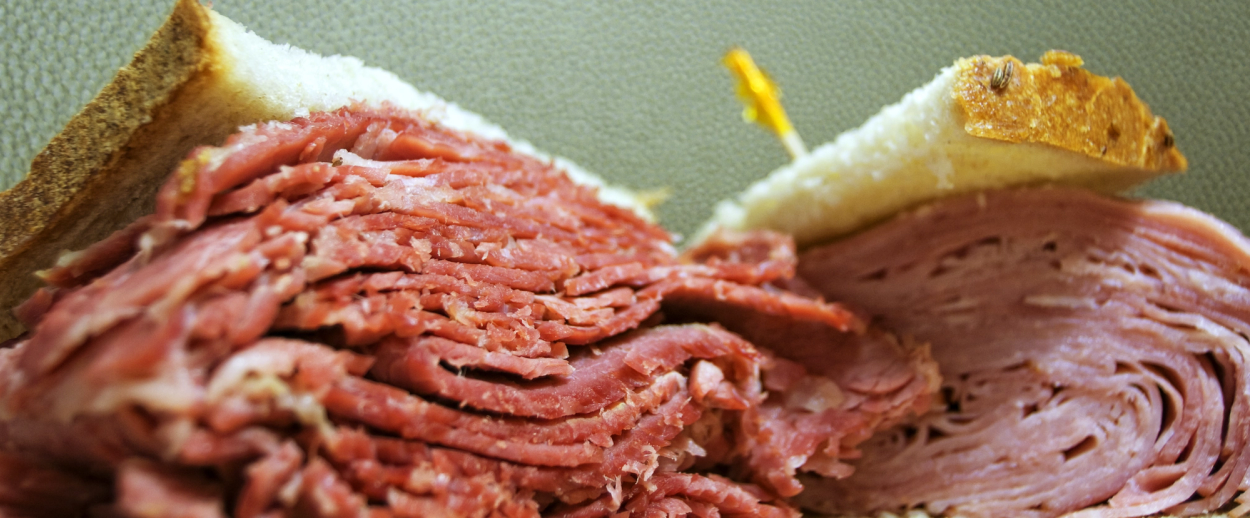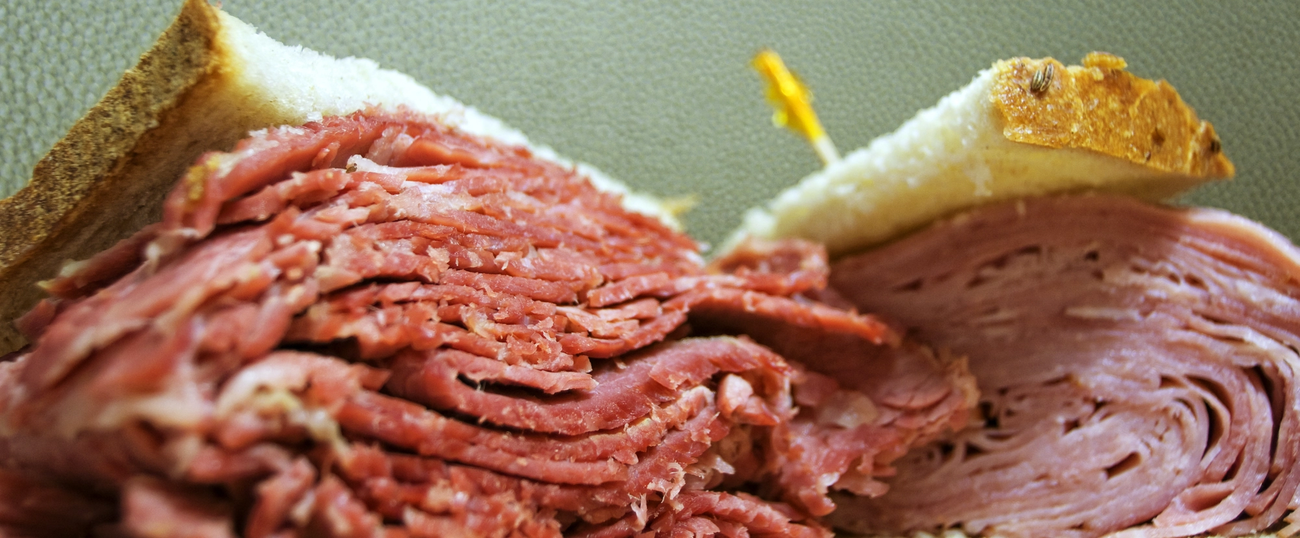The Deli at the End of the Road
A childhood trip to a mysterious deli taught me the value of not asking for directions




This will be my first Father’s Day without my father. My brother and I plan on toasting his memory over kosher corned beef sandwiches.
One time in the early 1960s—when I was 11—we were driving with our parents from our home outside of New Haven to visit our grandparents who lived in Far Rockaway, Queens. My father was always the driver, even though my mother was perfectly competent. My brother and I horsed around in the back seat.
We made that New Haven-Rockaway trip so often that my father probably could have done it with his eyes closed, and being a former Marine, he would have done so if he were thus challenged. On this particular trip, though, there was a detour right after we crossed the Whitestone Bridge, and my father found himself headed not toward Far Rockaway but toward Long Island Parts Unknown. He wouldn’t admit that we were off course. As a New York City native, he believed that he knew the highways as well as Robert Moses. And his code of Marine self-sufficiency prevented him from even asking the man at the tollbooth how to get back to the highway that would take us to our grandparents.
By now, we had been in the car for three hours, an hour-and-a-half overdue, nothing looked familiar, and we were getting hungry. The hungrier we got, the louder we got, the more annoyed my mother became at my father’s stubbornness, and the more I worried that my grandparents were going to worry that something bad had happened to us. I was that kind of kid, always worrying. It never occurred to my father to get off at a gas station—not to ask for directions, Heaven forbid, but to use the pay phone to call his parents.
A half hour later, the three of us knew what my father refused to acknowledge: We were hopelessly lost. We weren’t near Far Rockaway, and my brother and I were convinced we would soon expire from lack of nourishment.
It was then that my father demonstrated one small weapon in the survival toolbox that stood him in good stead during WWII, and for his entire life: the Diversion Ploy.
“Listen, you skeptics, I know where I’m going,” he announced. “Only to the best kosher deli in all of Long island.”
The mood in the car instantly lifted. We lived for great kosher deli. New York had the Yankees, most of the TV stars we watched on the two channels we could receive in New Haven, and great kosher deli. As transplanted New Yorkers, we had to settle for what New Haven had to offer, which was clearly inferior. By the time deli traveled up the Merritt Parkway, it lost its essential deliness, that pungent mix of salt and sweat and pepper. It became more New England-like, proper and safe. Years later, I noticed that same trait in New Yorkers who moved to Connecticut. They became less ethnic, less loud, less interesting.
I became a believer, and because my brother was only 6, so did he. I stopped worrying about my grandparents worrying that we had fallen into a ditch. I stopped thinking of my grandparents.
My father kept a running monologue: “This kosher deli is so good that people flock there from the entire tri-state area. They sometimes get lost but it’s worth it when they finally arrive. You can smell the aroma from the street. The pickles in their brine. The corned beef luxuriating in its own steam in the covered pot, just waiting for the Effrons to arrive so it can be thinly sliced into a sandwich. Oh, the kishka! I forgot to mention the kishka!”
Kishka was a delicacy—stuffed cow intestine, but we never thought of it that way. It was sublime bar mitzvah food, a round disk of orange covered with gravy that was served as an appetizer. Before the heavy stuff.
By now my brother and I were out of our minds with excitement and anticipation. Whatever skepticism I might have harbored disappeared as I entered into a reverie of anticipation of this perfect New York deli.
After another 15 minutes of highway riding, my father abruptly swerved right and barely made the exit.
“Are we almost there yet, Daddy?” my brother asked, with slight fear in his voice, since we didn’t seem to be anywhere near anything: not our grandparents, not a kosher deli.
“Trust me,” said my father.
We passed a synagogue, a couple of candy stores, a supermarket, a stationery store, a toy store, an E.J. Korvettes. Then, like the first time you see Cinderella’s Castle at Disney, that familiar neon red kosher sign rendered in Hebrew letters suddenly appeared. I gasped. My brother clapped. It was a beacon, an oasis. My father pulled the car to the curb, turned to the backseat and spoke to us, but actually directed his words to our mother, a skeptic until she actually saw the words “kosher deli.”
“You see, I knew where I was going,” he said. “Corned beef sandwiches, coleslaw, and potato salad coming right up!”
We walked inside. In my memory, it was larger and cleaner and sleeker than any kosher deli I had ever been in. When we sat down, we must have looked like refugees (from New Haven?) because the waiter patted my arm, and said: “Don’t worry. You’re at Charney’s now.”
The kishka arrived. Each piece (and there were four orders) was the size of a hockey puck, dripping in suet and gravy. The pickles came in a large metal canister, which kept getting refilled. It might have been the best kosher corned beef we ever had. They treated my father like a king, my mother like his queen, and my brother and me like the princes. My father beamed at us, the implication being he was always right.
I don’t know how he ever found the place, but I suspect he saw the synagogue from the highway before he abruptly took that next exit, knowing that where there were Jews, there was bound to be a kosher deli. My father certainly wasn’t about to let us know he’d ever had any doubts about where he was headed.
We never could find the place again. I’ve done Google searches for every variation of the name, to no avail. But when my dad died last year, I thought of it again, and how he made believers out of us.
***
Like this article? Sign up for our Daily Digest to get Tablet Magazine’s new content in your inbox each morning.
Mark Effron, a veteran television executive, now teaches journalism and television and digital media at Montclair State University in New Jersey.